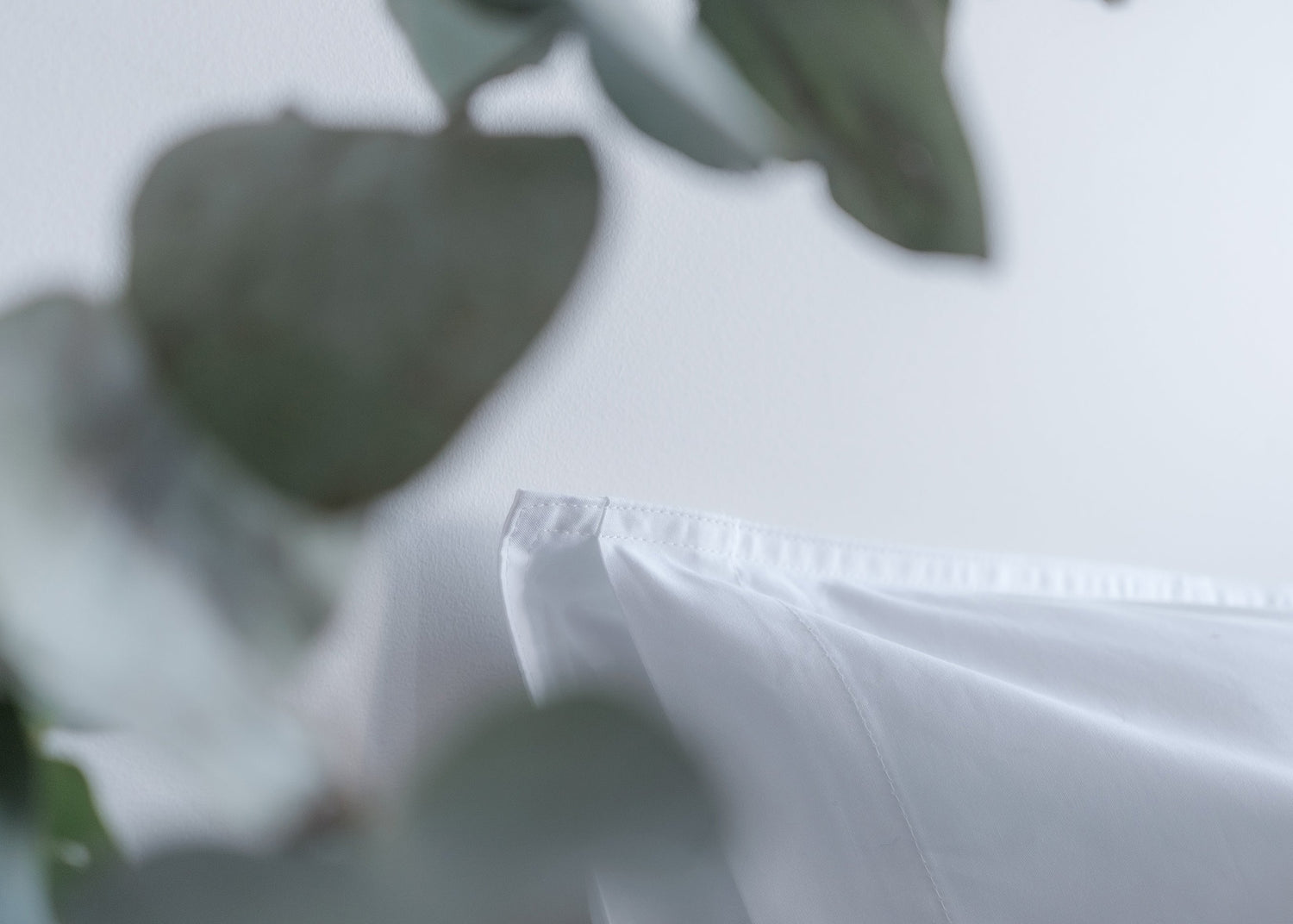
How Do You Choose Bedding That Won’t Make You Overheat in Hot Weather?
Share
When summer arrives in Australia, our nights can quickly turn from peaceful to sticky. You throw the sheets off, turn the pillow over, maybe even kick a leg out just to find a pocket of cool air. But what most people don’t realise is that the problem isn’t always the temperature - it’s the bedding itself.
The materials you sleep on can either help your body regulate temperature naturally, or trap heat and humidity like a plastic wrap. And if your sheets are synthetic, coated, or poorly woven, they’re probably doing the latter.
So, how do you choose bedding that won’t make you overheat in hot weather? The answer lies in understanding what your sheets are made from, how they’re woven, and how they interact with your body’s natural cooling system.
Let’s break it down - and explore why our organic cotton and European flax linen sheets are two of the best investments you could make for a truly cool, comfortable summer sleep!
Why Do We Overheat at Night?
Our body temperature naturally drops as we prepare for sleep. It’s part of our circadian rhythm - the internal clock that tells us when to rest. But if your bedding traps heat, your body struggles to cool itself down, interrupting that natural rhythm.
This leads to what’s called “thermal discomfort” - when you’re too hot to fall into deep sleep or stay asleep for long. You might wake up sweating, restless, or feeling dehydrated.
Add Australia’s humid summer nights to that equation, and you have a recipe for sleeplessness.
The goal, then, is to choose bedding that works with your body, not against it. That means materials that:
Breathe: let air circulate so heat doesn’t build up.
Wick moisture: absorb and release sweat before it clings.
Stay dry: resist dampness or that sticky feeling that wakes you up.
Feel cool to the touch: not heavy or plasticky.
And that’s where natural fibres - like organic cotton and linen - shine.
Why Synthetic Sheets Fail You in Summer
It’s easy to be drawn to silky “microfibre” or “bamboo blend” sheets that promise softness and low prices. But those materials often contain polyester, which is a form of plastic.
Polyester doesn’t breathe - it traps heat and moisture. The result is a micro-climate that’s warmer and more humid than your body wants. This can:
Increase sweating during the night.
Lead to breakouts or rashes (since sweat and oil get trapped).
Disrupt REM cycles and overall sleep quality.
Create a musty smell faster, because synthetic fabrics hold bacteria.
By contrast, pure plant-based fibres like cotton and flax regulate temperature naturally. They’re porous, absorbent, and free of the chemical coatings that make synthetics clingy and hot.
That’s why switching to 100% natural bedding - like ecolinen’s - can transform your sleep immediately.
The Case for Organic Cotton
Organic cotton is a classic for good reason. It’s smooth, crisp, and naturally breathable - perfect for anyone who loves a clean, hotel-style sleep experience.
But not all cotton is equal.
ecolinen’s organic cotton sheets are made from long-staple cotton, meaning each fibre is extra-long and silky. This produces a fabric that feels smoother, lasts longer, and resists pilling - while staying airy enough to keep you cool through the night.
What Makes Organic Cotton Cool?
Breathability: Cotton allows air to pass through its weave, keeping your body at an even temperature.
Moisture wicking: It absorbs sweat from your skin and releases it into the air.
Natural softness: Organic cotton isn’t coated with synthetic resins, so it feels lighter and cleaner on the skin.
Temperature balance: It keeps you cool in summer and comfortable in winter - an all-season hero.
And because ecolinen’s cotton is certified organic, it’s grown without pesticides, herbicides, or chemical fertilisers. This isn’t just better for the planet - it also means fewer skin irritants for you.
Many people don’t realise that conventional cotton is treated with finishing agents to make it look shiny and crisp in packaging. Those agents can seal the fibre surface, reducing breathability. ecolinen’s organic cotton avoids all of that, leaving the fibres open and naturally porous.
The result? A sheet that breathes better, feels cleaner, and stays cooler.
The Case for European Flax Linen
If organic cotton is the dependable classic, European flax linen is its effortlessly cool cousin - the one that looks luxurious without even trying.
Linen is made from the stalks of the flax plant. It’s one of the oldest fibres known to humankind, used for thousands of years for its ability to stay cool in heat and warm in cold.
But what sets ecolinen’s linen apart is the source: premium flax grown in France and Belgium under the European Flax® certification, which ensures traceability, sustainability, and zero irrigation farming.
Why Linen Keeps You Cool
Thermoregulation: Linen is a hollow fibre, meaning it insulates when needed but releases heat quickly.
Airflow: The natural slubs and open weave create space for air to circulate.
Moisture absorption: Linen can hold up to 20% of its weight in moisture before it even feels damp - so you stay dry.
Texture: That slightly rustic texture lifts off your skin, reducing surface contact and heat retention.
Sleeping on linen feels like sleeping in fresh air - breathable, light, and effortlessly comfortable. It’s also anti-static, naturally antimicrobial, and gets softer with every wash.
While linen can cost more upfront, its durability makes it a long-term investment.
ecolinen’s linen sheets are designed to last for years, backed by a 3-year quality guarantee - so you’re buying once, not replacing every season.
Weave, Weight, and Colour - Small Details That Change Everything
Beyond the fibre itself, three other details affect how cool your bedding feels: weave, weight, and colour.
The Weave
For cotton, a percale weave is ideal for summer. It’s tightly woven yet crisp, creating that matte, hotel-sheet feel that gets softer over time. It allows steady airflow without feeling flimsy.
For linen, the weave is inherently open - nature’s built-in ventilation. ecolinen’s linen is woven in small batches for consistent texture and breathability, without the stiffness you find in cheaper linen sets.
The Weight
Heavier fabrics trap more heat. Both our Organic Cotton and European Linen are light and airy but still aid in temperature regulation throughout the night- both perfect for warm climates where nights can still drop cool towards morning.
The Colour
It might sound superficial, but colour matters. Darker shades absorb and hold heat, while lighter ones reflect it. ecolinen’s palette - from chalk and oat to flax and cloud - is inspired by coastal minimalism and deliberately designed to stay visually and physically cool.
Sustainability Meets Comfort
It’s not just about sleeping better - it’s about doing better.
Choosing organic or European flax linen bedding means choosing fibres grown with less water, fewer chemicals, and a lower carbon footprint.
ecolinen partners with certified mills that use rainwater irrigation and closed-loop systems to minimise waste. Every product is packaged plastic-free and designed for full circularity - meaning it can return safely to the earth once it’s truly worn out.
And because ecolinen guarantees each product for three years, you’re not buying into disposable homeware culture. You’re investing in longevity - in bedding that’s made to last, not landfill.
How to Care for Your Sheets (and Keep Them Cool)
Even the most breathable bedding needs proper care to perform its best.
Wash weekly in cold or warm water (below 40°C). Hot water can damage natural fibres over time.
Use a gentle, natural detergent. Harsh chemicals break down the weave and reduce softness.
Avoid fabric softeners. They coat fibres and block airflow.
Line dry whenever possible. Sunlight naturally freshens fibres and kills bacteria.
Store in a cool, dry space. Avoid sealed plastic tubs - natural fibres need to breathe even when not in use.
Over time, you’ll notice your organic cotton sheets growing silkier and your linen sheets softening beautifully - a sign of true quality.
Which Should You Choose: Organic Cotton or Linen?
The right choice depends on your personal sleep style.
If you love crisp, smooth sheets that feel light and structured - like a fresh five-star hotel bed - go for our organic cotton. It’s perfect for those who want minimal texture and an easy, polished look year-round.
If you prefer a more relaxed, breathable feel - something breezy, coastal, and luxuriously undone - European flax linen is unbeatable. It regulates temperature naturally, wicks moisture effortlessly, and creates that soft-rumpled look that gets more beautiful with time.
You can’t go wrong with either. Both options are sustainable, breathable, and backed by ecolinen’s three-year quality promise.
The Real Secret to Sleeping Cool
A cool night’s sleep doesn’t start with air-conditioning - it starts with your sheets. When your bedding is made from natural, breathable fibres that let heat escape, your body can rest in its ideal temperature zone.
That means deeper sleep, steadier energy, and fewer restless wake-ups.
So if you’re tired of waking up hot and tangled, it might be time to upgrade. Whether you fall for the smooth coolness of ecolinen’s organic cotton or the effortless luxury of their European linen, you’ll be giving yourself more than just bedding. You’ll be giving yourself better rest.

